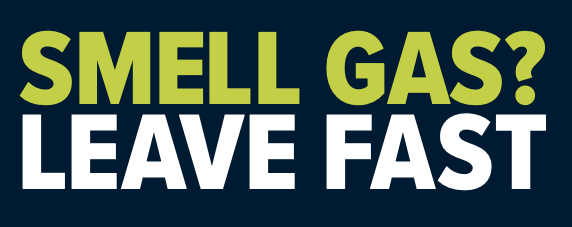September 2022 Bill Insert: Smell Gas? Leave Fast

Important Natural Gas Safety Information
If you smell gas, leave fast.
Leave the area and then call us at 402.554.7777 or 911. There is no charge.
How to recognize a leak:
SMELL – Recognize the odor which is similar to a skunk, rotten eggs or sulfur.
SIGHT – See a white cloud, mist, fog, bubbles in standing water or blowing dust. See dead vegetation spots in the grass.
SOUND – Hear an unusual noise like roaring, hissing or whistling.
Natural gas has an excellent safety record, but like all forms of energy, it must be handled with caution. If inappropriately handled, it may cause a hazardous condition such as a fire, explosion or asphyxiation.
What to do if you suspect a leak:
Move to a safe environment away from the building.
Do not use a land line phone or cell phone inside the building.
Do not use any light switches, matches, candles, lighters, flashlights, motors or appliances. Doing so could produce a spark, ignite the gas and cause an explosion.
Call 402.554.7777 or 911 and provide your location.
Let us know if construction or digging activities are going on in the area.
DO NOT ASSUME SOMEONE ELSE WILL REPORT THE CONDITION.
Why natural gas smells like rotten eggs
Gas has no odor and is invisible. We add a chemical so you can detect a gas leak. The smell is compared to skunk, rotten eggs or sulfur.
Decreased sense of smell
If you have a decreased sense of smell, you may want to buy a natural gas sensor. Most models are available for less than $60. They are easy to install and they monitor carbon monoxide, methane (natural gas) and propane. The unit should have the UL (Underwriters Laboratory) seal of approval.
Natural gas is safe when used properly.
Natural gas has an excellent safety record, but like all forms of energy, it must be handled with caution. Natural gas alone will not burn or explode; it requires the right amount of air and an ignition source. If inappropriately handled, it may cause a hazardous condition such as a fire, explosion or asphyxiation.
Maintain appliances to avoid carbon monoxide.
When burning fossil fuels (wood, propane, oil, natural gas), carbon monoxide (CO) can be produced by lack of air, improperly working appliances or poor flue conditions.
If someone is overcome by CO, call 911.
To prevent CO:
• Be sure flue connections and venting are in perfect working order—unobstructed and properly fitted.
• Have your heating system inspected every year by a qualified heating contractor.
What to do during a disaster
In the event of a disaster, unless there is substantial damage to your home, don’t turn off the gas. Simply turn off all gas appliances — stove, oven, gas fireplace, etc. — as you would if leaving your home.
If there is a situation where gas needs to be shut off, we will take care of it, and keep customers informed via the news media. If you do turn off the gas at the meter, don’t turn it back on. Call Customer Service at 402.554.6666.
Safety Precaution Checklist
- Have natural gas appliances, heating system, chimney and venting systems inspected every year by a qualified heating contractor.
- Gas appliances and furnaces need fresh air for proper combustion. Combustion products need to be vented to the outdoors. Keep flues, ducts and vents attached to appliances and heating systems in good condition and clear of obstructions.
- Use a clean filter. Standard furnace filters need to be cleaned or changed more often in winter. Check the owner’s manual for frequency.
- Do not use gas ovens to heat a room or for any purpose other than cooking.
- Teach children about safety around all household appliances.
Visit our Safety page for more tips.
Download the insert






